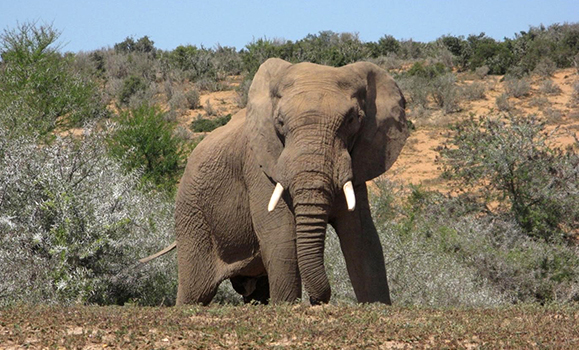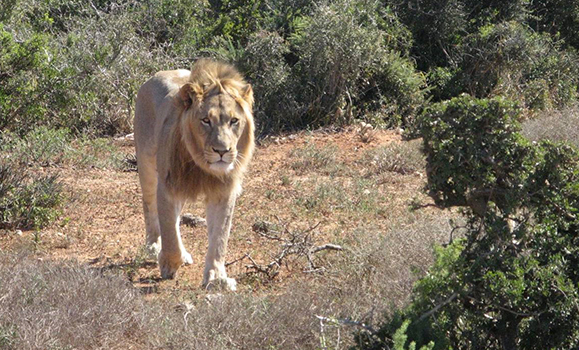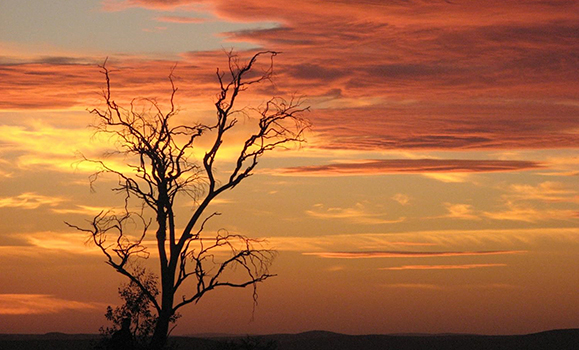For Dan Parker, it never gets old: stunning sunsets, sounds of the African night coming alive, watching lions sneaking up on unsuspecting wildebeests and project work amongst the wildlife on the conservation reserve in South Africa.
A wildlife biologist at Rhodes University, Dr. Parker is passionate about teaching zoology at all levels and has been running African Wildlife Ecology courses for international universities in the Eastern Cape of South Africa since 2003.
“Students can expect to be wowed by the sheer diversity of wildlife in South Africa, especially the larger mammals,” says Dr. Parker. “We also have an amazing diversity of cultures and a rich political history which all culminates to set the scene for a highly dynamic and fascinating introduction to what it is like to conduct and be involved in wildlife research in Africa.”
The African Wildlife Ecology Course is an optional three-week credit course for students pursuing a degree in Bioveterinary Science, a new program being offered this fall on the Agricultural Campus in Truro.
“The Faculty of Agriculture is proud to be partnering with Rhodes University, one of South Africa’s leading research universities and its world renowned Wildlife & Reserve Management Research Group on the development and delivery of this unique and innovative course,” says Dalhousie Dean of Agriculture David Gray. “The Faculty of Agriculture truly believes in applying theory to practice, real ‘hands-on learning’ and this is a fantastic example of that approach.”

Exploring South Africa's ecology
South Africa has seen a dramatic shift in how land is used over the last 20 years with many previously marginal farming properties turned into privately owned wildlife preserves for photographic tourism. Numerous wildlife species have either been re-introduced or introduced to attract tourists.
“While this dramatic shift in land use has undoubtedly promoted the conservation of biodiversity as a whole, many farming ventures — especially of livestock — remain situated ‘cheek-by-jowl’ next to these what we call 'game reserves,'” Dr. Parker explains.
“This means that the likelihood of wildlife diseases being passed onto livestock is theoretically increased. Moreover, photographic tourists generally want to see predators and such wildlife species are certainly not welcomed on livestock farms. The ultimate result is that the potential for human-wildlife conflict and human-human conflict is increased, but this scenario makes for wonderful research and teaching opportunities.”
Students in the African Wildlife Ecology Course will be given lectures on such topics as anthropology, ecology, animal behaviour, palaeontology and the climate and history of the region. They will also be taken on field trips to surrounding areas to experience various ecosystems including Addo Elephant Park and Mountain Zebra National Park.
Dean David Gray was able to study in South Africa when he was a student, and says the experience has stayed with him through his career.
“The biology and ecology you get to see, to liv, is in a different league to what we are all used to here in the northern hemisphere. And if you bring in “The Big Five” [lion, elephant, cape buffalo, leopard, and white/black rhinoceros] then things get REALLY exciting. Predator-prey relationships, conservation, ecological interactions from micro to macro scales and you’re living right in the middle of it all. It is simply fantastic!"

Busy days in the field
A typical day in camp begins with a pre-dawn wake-up call with just enough time to shower and get to the dining room for a 7 a.m. breakfast, with the ability for faculty and students to mingle and discuss their unique experiences.
After breakfast it is out into the field to conduct group research. Generally, students are assigned to groups of about three or four to tackle a specific mini-research project throughout the course. These projects cover topics such as small mammal diversity, bird diversity, antelope behaviour, camera trapping and habitat functioning, amongst others. Some projects involve driving out onto the main reserve area in open-sided vehicles with qualified field guides to do project work amongst the wildlife, usually spotting a member or two of the “big five” along the way.
After project work, it’s back to camp for lunch and often a lecture from a visiting researcher or graduate student. Afternoon schedules vary depending on the weather but often will involve additional fieldwork for projects, fieldtrips to distant parts of the reserve, data crunching and group discussions.
“On some evenings arrangements are made for a night drive through the reserve to try and locate some of the nocturnal animals who skulk away during the day,” says Dr. Parker. “If not, then there is often time to journal — if there isn’t a lecture — or sit and discuss the ways of the natural world over a steaming cup of hot chocolate. South Africa is a real melting pot when it comes to biodiversity.”
Facilitators of the program are currently negotiating the possibility of having the students involved in a veterinary procedure for a white rhino, which would be completely hands-on.
“I would say the student who will get the most out of this course is the student who is prepared to immerse her or himself fully into African natural history and how the socio-economics and politics of South Africa colour the conservation landscape,” added Dr. Parker. “Pre-trip reading is essential but so is active engagement with the issues and people on the ground in country. Work hard and you will reap the rich rewards.”
For more information on this program please contact Kendra Mellish at kendra.mellish@dal.ca.

Comments
comments powered by Disqus

